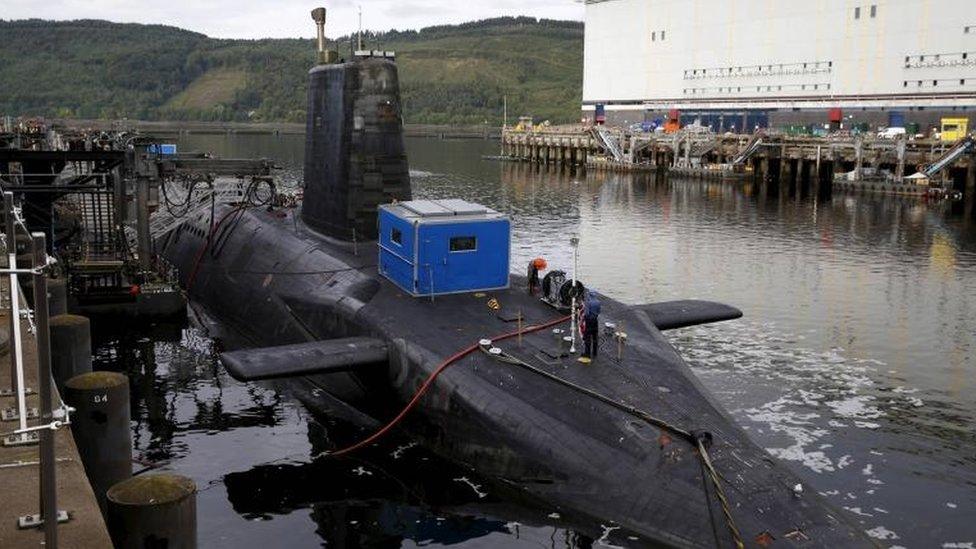The health of Rolls-Royce matters to the nation
- Published
- comments

If Rolls-Royce made chocolate bars, the performance of its various divisions would not be the subject of discussion at Number 10, the Treasury and the Ministry of Defence.
The fact that it makes the engines for the UK nuclear submarine fleet means that it is.
Particularly given that the next generation of nuclear submarines - due to be deployed by 2030 - is being planned by the government.
Next year, the Ministry of Defence wants to have in place the procurement process for the replacement Trident programme, called Successor.
It is likely to be overseen by a specialised government delivery body which reports to ministers.
Rolls-Royce, the defence contractor BAE Systems and engineering firm Babcock International will be leading the Successor programme.
In the first two, the government owns a "golden share" meaning that if the business wants to sell any significant part of the operation that could have an effect on national security, the government would have to be convinced.
And that is where the government's concerns about Rolls-Royce come into focus.
Today the Financial Times reports, external that the Cabinet has drawn up contingency plans should Rolls-Royce's travails become so acute that a break-up is on the cards.
The FT suggests that could even mean taking Rolls-Royce's nuclear business into public ownership.
Marine sale 'almost impossible'
Senior figures in the defence industry believe we are a long way from that moment, despite four profit warnings from Rolls-Royce in the last two years.
And sources close to the engineering company say there has been no discussion with the government on any such moves.
Yes, Rolls-Royce has been struggling with delivery issues in its nuclear division, with a slowdown in its marine business (connected to the low oil price and lack of infrastructure investment) and aviation division (as maintenance for older aircraft is wound down by airlines).
But Warren East, the new chief executive, says that there are no plans for major sell-offs and certainly knows that any sale of the marine business - which includes nuclear - would be "almost impossible" as one senior figure close to the company described it to me.
Senior defence figures point out that any foreign buyers such as Siemens (from Germany) or United Technologies (American) would immediately come up against the foreign ownership ban the government has in place.
That leaves BAE as a possible buyer, already of course cleared to work on highly sensitive defence projects for the government.
But there are an awful lot of stages between where Rolls-Royce is now and a possible purchase by BAE.
First, it would see a major consolidation in the defence industry, leaving the consumer (that's the government and by extension the taxpayer) with fewer options and probably higher prices as a consequence.
And the government would certainly not be too keen on that.
Second, if Rolls-Royce was in such a distressed state that the government went to BAE to encourage a sale, the memory of the last time the government asked one business to rescue another for the good of the nation might loom large for BAE's board and shareholders.
Lloyds' takeover of HBOS at a time of national crisis did not end well for either party.
New investor
The twitchiness in government over Rolls-Royce's performance comes from two sources.
Firstly, concern that Rolls-Royce's problems will affect delivery of the Successor programme.
One source close to Rolls-Royce admitted there had been "tensions" over the performance of the nuclear division and I am told the MoD has raised concerns.
And, second, that a new activist investor, ValueAct, a hedge fund based in San Francisco, has built up a considerable stake in Rolls-Royce and is now its largest investor by some margin.
A stake of that size brings considerable influence over the direction of the company.
Although Rolls-Royce's management insists that relations with ValueAct are cordial and mutually supportive (both want to see the business operate more successfully), that of course could change.
ValueAct certainly appears to want Rolls-Royce to look at how its business divisions can perform better - and that could mean selling off parts of the company.
Rolls-Royce insists that its business is fundamentally strong and that Mr East has in place plans for a revival.
But with Rolls-Royce share price down by more than 30% in a year, all options are ultimately on the table, even if some of them - a nuclear sale or nationalisation - are rather remote.
Nevertheless, the government wants to ensure it has contingency plans to cover any eventuality.